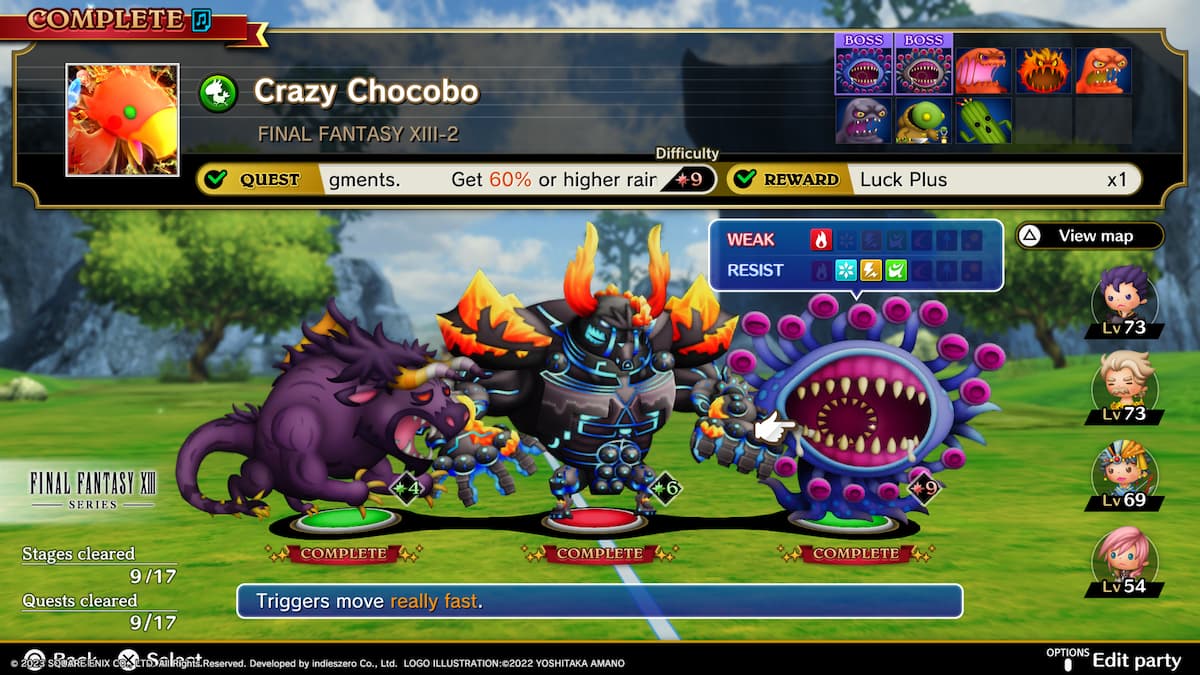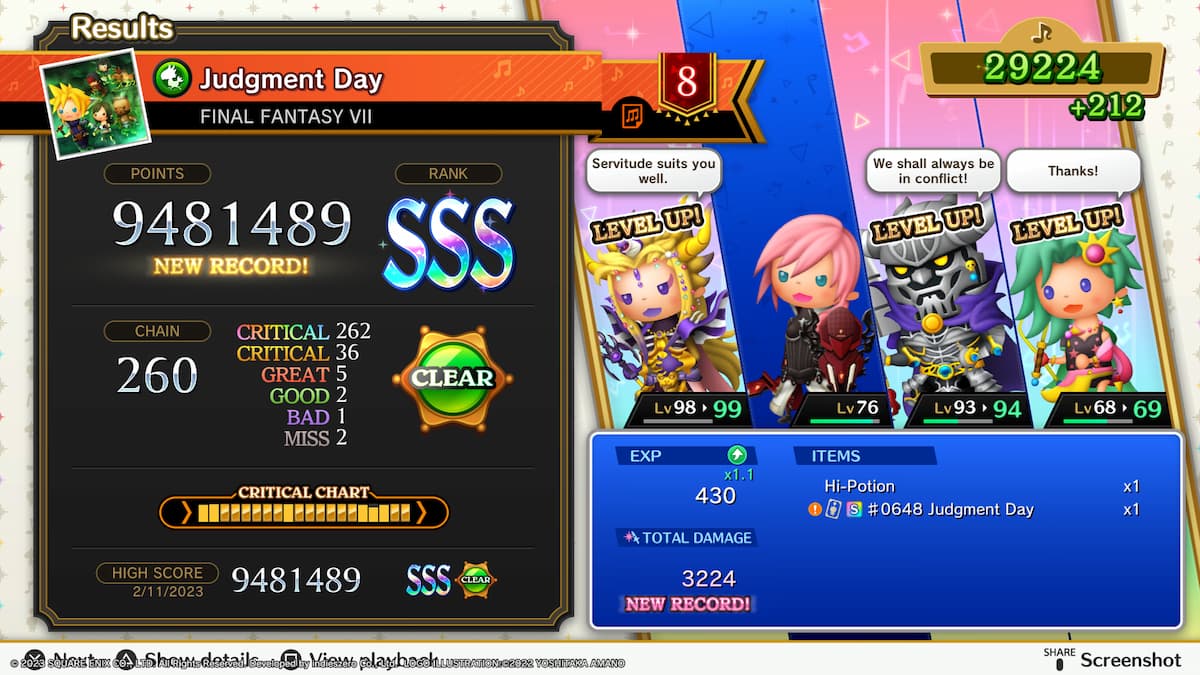While Japan has seen the likes of Theatrhythm Dragon Quest and Theatrhythm Final Fantasy All-Star Carnival, it’s been nine years since western fans last got their fix. As part of Final Fantasy’s 35th-anniversary celebration, Theatrhythm Final Bar Line is a nearly perfect culmination of the work developer indieszero started over a decade ago.
As a rhythm game, it’s both accessible and rewarding. As a celebration of the Final Fantasy brand, it’s virtually unmatched.
For a series that began exclusively on touch screens before offering an optional button control scheme in its sequel, Theatrhythm gameplay maps remarkably well to standard controllers. Most note triggers can be activated by pressing any face button, shoulder button, or trigger. Meanwhile, slide triggers let you swipe with either analog stick.
This simple setup makes a world of difference for easing newcomers into things, and it provides options for all. Most players will likely gravitate toward face buttons due to those being the defacto input for most console rhythm games, but more experienced players can settle on the triggers or shoulder buttons to offer instant access to every possible trigger arrangement on the harder difficulty settings.
While this switch is inevitable for those hoping to engage with high-level play, Theatrhythm Final Bar Line doesn’t force you to reach such a high bar. The game’s core progression revolves around series quests, with each Final Fantasy game getting its own miniature questline. However, some titles are grouped together into one series, such as the Final Fantasy 13 sequels.
You move along a linear path, clearing songs to progress through the series. Completing each song unlocks it for use as a standard music stage, divorced from any of the optional quests. This is where Theatrhythm Final Bar Line caters to multiple audiences without compromise. Those who want to just play for the core experience can do exactly that. The satisfying gameplay remains the same regardless of your party composition. However, completionists and role-playing fans will get a lot out of the RPG systems.
Quests vary in difficulty, with most of them being as simple as clearing with a certain score or having a specific character in your party. However, roughly one-third of the quests are difficult enough that you’ll have to make calculated decisions regarding party composition and skill loadouts. The quests that ask you to defeat bosses within a specific period of time or deal a certain amount of damage are nigh impossible to complete without strategy and focus.
The move to a controller as the only input method has a profound impact on the high-level experience. By ditching the resistive touch screen, indieszero has created far more exciting gameplay scenarios. Dual slide triggers require flicking two analog sticks either in the same or opposite directions. These are among the most satisfying notes to rainbow critical, the equivalent to perfect timing.
Additionally, any difficulty mode beyond basic frequently tasks you with complex combinations. For example, you might be required to hold down a hold trigger while timing multiple slide triggers. The sense of accomplishment afforded by these expanded controls is unmatched within the Theatrhythm series.
Self-improvement is a huge part of any rhythm game. However, not everyone is intrinsically motivated to chase a higher score. After all, everything can be unlocked on the basic difficulty here. That’s why scoring systems are so integral to a proper feedback loop. Thankfully, Theatrhythm’s extensive grading system clearly communicates your progress with ranks ranging from F to SSS.
It helps that the RPG elements can also factor into this feedback loop. With a party of healers as a safety net, some will find the extra help useful for clearing more difficult songs.
To shake things up further, there’s the new Endless World mode, which unlocks after finishing the main game. Endless World replaces Curtain Call’s Quest Medleys and acts as an endurance run, putting you in an endless series quest with a total of three life points. Unlike the core series quests, failing to complete a quest here results in losing health. The run ends once you’ve lost all of your life points.
You’ll need to min-max to survive, and the game keeps track of your best runs, with a perfect chain streak tracker that carries from song to song. It’s an addictive wild card that can add hours of play to Bar Line’s other modes.
The sour note in the orchestra is that some of the most iconic Final Fantasy songs are only available in the Deluxe Edition of the game. While there are 90 post-launch DLC songs planned and the base game includes up to 403 songs when event stage versions are accounted for, locking 27 quintessential tracks behind what amounts to an $80 paywall flies in the face of the 35th-anniversary celebration surrounding this release.
Songs like Final Fantasy 8’s “Eyes on Me” or Crisis Core’s “Why”, and Final Fantasy 10’s “Zanarkand” theme (which was in the original game 11 years ago) just aren’t available for those who pick up the base game.
There are also some odd filler songs and a lack of attention to specific FF titles in the base game. There are four versions of “One-Winged Angel” in the base game, along with multiple renditions of a few other songs like “The Man with the Machine Gun”. These additional renditions would have made for more tasteful inclusions within a deluxe edition for hardcore fans in lieu of omitting others from their respective entries.
To be clear, my review code provided by Square Enix was for the premium deluxe edition, which comes with all the DLC and the exclusive deluxe edition songs. Despite being given access to this extra content, there are better ways Square Enix could have accommodated for a deluxe edition for all fans.
Theatrhythm Final Bar Line Review — The Bottom Line
Pros
- The franchise’s most complex and satisfying gameplay.
- Staggeringly large tracklist.
- Addictive progression systems.
- Proper grading system incentivizes consistent growth.
Cons
- Iconic songs locked behind deluxe edition.
- PS5 version with instant load times would be nice.
Theatrhythm Final Bar Line is one of the finest rhythm games of all time. Even if you don’t have a special attachment to the Final Fantasy series, you’re still bound to connect with this game on some level. It’s impossible not to with some of the most iconic, exciting, and evocative songs in all of gaming. It helps that such memorable tracks are backed up by the franchise’s most engaging and complex gameplay to date.
For as accessible as this game can be, many of Final Bar Line’s most noteworthy additions exist for those well-familiar with the series. Aside from the generally more complex triggers, this version of Final Bar Line introduces a fourth difficulty setting for many songs that truly tests players.
Most quests also include rewards and collectibles, too, such as character CollectaCards or memory or album CollectaCards. The album and memory CollectaCards largely consist of screenshots of either cinematics, gameplay, or artwork from various points across the franchise’s timeline. The inclusion of these further reinforces Square’s commitment to crafting the ultimate Final Fantasy extravaganza. The amount of content is so staggering that it’s daunting. It’s just too bad some is locked away in the more expensive version.
[Note: Square Enix provided the copy of Theatrhythm Final Bar Line used for this review.]











Published: Feb 13, 2023 09:47 pm